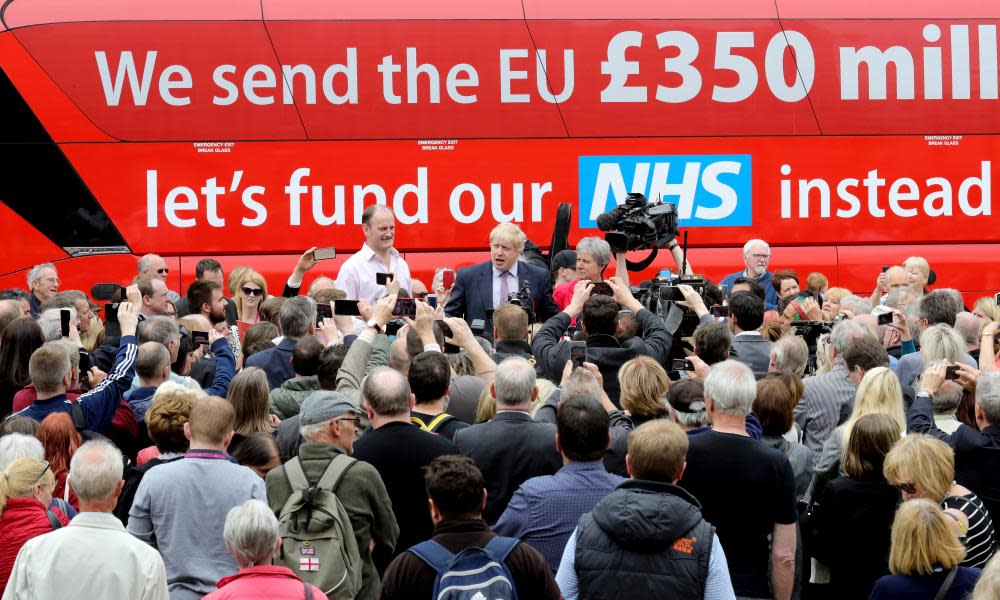Remain MPs list 10 Brexit promises to 'hold government to account'

A cross-party group of pro-remain MPs is to publish a list of 10 pledges it says ministers have made over Brexit in areas including trade, security and rights, warning that the British people will expect the promises to now be kept.
Open Britain says it plans to “hold the government to account for their Brexit contract with the British people” once negotiations start after article 50 is triggered on Wednesday.
The list of pledges was due to be formally announced on Tuesday morning in London by MPs who back Open Britain – Nicky Morgan for the Conservatives, Chris Leslie for Labour and Nick Clegg, the former Liberal Democrat leader.
The trio will argue, according to Open Britain, “that the government has set out on a course towards hard Brexit because the direction of travel was based on the direction of travel set by the Vote Leave campaign”.
The 10 pledges cover statements made by ministers in Theresa May’s government, or by the official leave campaign, which was backed by Boris Johnson and others now in government.
Some of the pledges will clearly not be met, as they have since been disowned or disputed by pro-leave ministers, most controversially the vow to spend £350m a week more on the NHS from savings gained by quitting the EU.
The pledges are:
Delivering the same benefits on trade as currently enjoyed by single market membership.
Having new trade deals ready to be signed on the day of departure from the EU.
Investing savings from Brexit in public services, including £350m a week for the NHS.
No changes to the border between Northern Ireland and the Republic.
Full protection of rights currently guaranteed by membership of the EU, including on employment and the environment.
A security deal that “maintains and enhances” such cooperation with the EU.
The integrity of the UK protected.
A strengthening of science and research partnerships with the EU.
Full exit, including ratification of a new deal, in 2019.
A dramatic reduction in net migration while “keeping the UK open to the talent and skills that UK business need”.
Comments released in advance by Morgan, Leslie and Clegg make it plain that they do not believe the pledges can be met by any final deal, and that they worry about the UK instead defaulting to World Trade Organisation terms.
In a foreword to what Open Britain calls the “Brexit contract”, the MPs write: “The phoney war is over. The government will trigger article 50 and officially commence the process of the UK leaving the EU. This fulfils the mandate of June 23rd 2016 and a new national debate must now take place over what is in the UK’s national interest.
“There is no mandate for the form Brexit takes: responsibility for the outcome now rests with those conducting negotiations and those advocating a hard Brexit.”
It was important to “ensure people are equipped to make judgments on whether negotiations meet the expectations they had when they voted last year, whether promises made then and since are being fulfilled, and whether our country and economy are likely to be stronger as a consequence of decisions now being taken”, they say.
“A clear direction of travel has been set by the government – and it is largely based on that set by the Vote Leave campaign.”
The MPs add: “As patriots, we want the best for our country. As realists, we fear the government’s Brexit contract may not deliver that outcome. And as democrats, we think that should be a judgment people and parliament are able to make.”
Several of the 10 points are similar to a smaller list of six “tests” for a deal set out on Monday by Keir Starmer, the shadow Brexit secretary, as necessary for Labour to back the process.
Ukip has also unveiled its own – very different – list of six red lines related to the “key tests” for the success of Brexit.
Article 50, which kicks off the formal two-year departure process, will be invoked on Wednesday. The next day the government is expected to lay out its plans for a so-called great repeal bill, which would bring EU measures into UK law.

 Yahoo News
Yahoo News 
